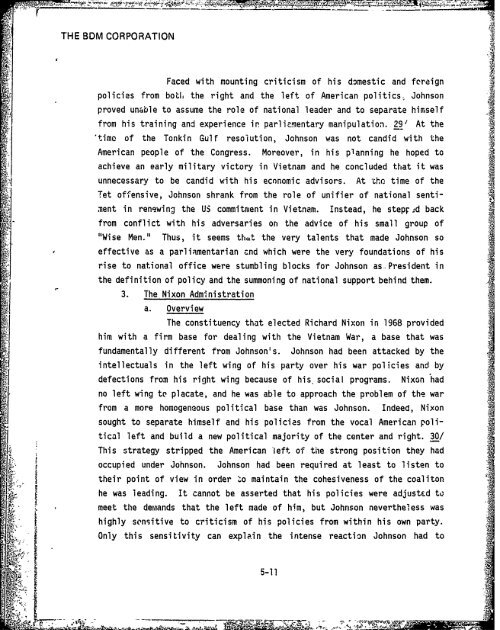policy - The Black Vault
policy - The Black Vault
policy - The Black Vault
You also want an ePaper? Increase the reach of your titles
YUMPU automatically turns print PDFs into web optimized ePapers that Google loves.
THE BDM CORPORATION<br />
Faced with mounting criticism of his domestic and fereign<br />
policies from botlh the right and the left of American politics, Johnson<br />
proved unable to assume the role of national leader and to separate himself<br />
from his training and experience in parliampentary manipulation. 29' At the<br />
'time of the Tonkin Gulf resolution, Johnson was not candid with the<br />
American people of the Congress. Moreover, in his planning he hoped to<br />
achieve an early military victory in Vietnam and he concluded that it was<br />
unnecessary to be candid with his ecnnomic advisors.<br />
At tho time of the<br />
Tet offensive, Johnson shrank from the role of unifier of national sentiment<br />
in renswinj the US commitment in Vietnam. Instead, he stepp.d back<br />
"I from conflict with his adversaries on the advice of his small group of<br />
"Wise Men." Thus, it seems that the very talents that made Johnson so<br />
effective as a parliamentarian and which were the very foundations of his<br />
rise to national office were stumbling blocks for Johnson as-President in<br />
the definition of <strong>policy</strong> and the summoning of national support behind them.<br />
3. <strong>The</strong> Nixon Administration<br />
a. Overview<br />
<strong>The</strong> constituency that elected Richard Nixon in 1968 provided<br />
him with a firm base for dealing with the Vietnam War, a base that was<br />
fundamentally different from Johnson's. Johnson had been attacked by the<br />
intellectuals in the left wing of his party over his war policies and by<br />
defections from his right wing because of his. social programs.<br />
Nixon had<br />
no left wing to placate, and he was able to approach the problem of the war<br />
from a more homogeneous political base than was Johnson.<br />
Indeed, Nixon<br />
sought to separate himself and his policies from the vocal American political<br />
left and build a new political majority of the center and right. 30/<br />
This strategy stripped the American 'left of the strong position they had<br />
occupied under Johnson.<br />
Johnson had been required at least to listen to<br />
their point of view in order *o maintain the cohesiveness of the coaliton<br />
he was leading. It cannot be asserted that his policies were adjusted to<br />
meet the demands that the left made of him, but Johnson nevertheless was<br />
highly sensitive to criticism of his policies from within his own party.<br />
Only this sensitivity can explain the intense reaction Johnson had to<br />
5-11 I<br />
•
















